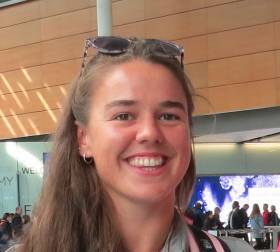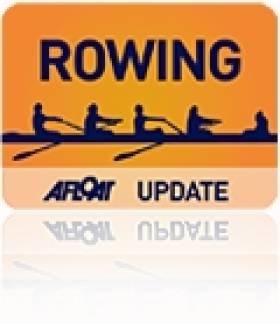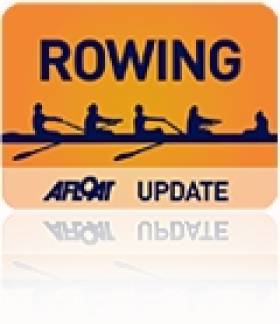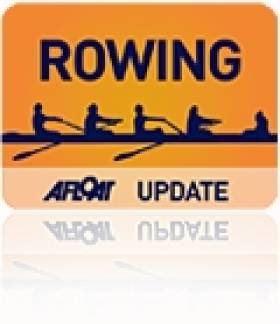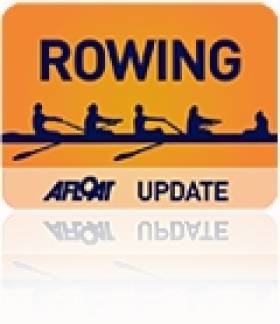Displaying items by tag: Piediluco,
Puspure Wins Single Sculls Heat in Italy
#Rowing: Sanita Puspure won her heat of the single sculls at the Memorial Paolo d’Aloja regatta in Italy, qualifying for Saturday’s A Final. The Ireland sculler had over a second to spare over second-placed Milda Valciukaite of Lithuania, an Olympic bronze medallist in the double in 2016. Emily Hegarty and Aifric Keogh qualified for the A Final of the pair with third in their heat, while Monika Dukarska and Aileen Crowley won a three-boat exhibition race in the women’s double.
Two Bronze Medals for Ireland at International Regatta
Ireland took two bronze medals at the Memorial Paolo D’Aloja International Regatta in Piediluco, Italy today. The men’s lightweight double scull of Mark O’Donovan and Niall Kenny took their second medal in two days, while women’s single sculler Sanita Puspure improved on her fifth placing in Saturday’s competition.
Memorial Paolo D’Aloja International Regatta, Piediluco, Italy Day Three, Sunday (Selected Results)
Men Lightweight Double Scull – A Final: 1 Spain 6:58.11, 2 Switzerland 7:00.06, 3 Ireland (M O’Donovan, N Kenny) 7:00.52.
Lightweight Single Scull – A Final: 1 Italy 7:33.80; 6 Ireland (M Maher) 7:59.96.
Women Single Scull – A Final: 1 Sweden (F Svensson) 8:31.39, 2 Lithuania (D Vistartaite) 8:31.65, 3 Ireland (S Puspure) 8:39.49; 4 Italy (G Bascelli) 8:45.25, 5 Lithuania (L Saltyte) 8:56.34.
Three Ireland Finalists On Second Day of Italian Regatta
Olympic Hopefuls O'Donovan and Kenny Take Bronze in Italy
ROWING: The Ireland lightweight men’s double took a bronze medal and Sanita Puspure finished fifth in the women’s single on the first day of A Finals at the Memorial Paolo D’Aloja international regatta in Piediluco in Italy today.
This was a first medal in a senior event for the lightweight double of Mark O’Donovan and Niall Kenny, who hope to represent Ireland at next month’s Olympic Qualifier in Lucerne. They did it by maintaining a high rate through a race which was won by Nuno Mendes and Pedro Fraga of Portugal – a crew which qualified for London 2012 by finishing 10th at last year’s World Championships.
Puspure, who is also targeting the Qualifiers, finished third in a group of three which disputed third in the closing stages of her race, with a second covering all three crews. The race was won by Serbia’s Iva Obradovic.
Justin Ryan finished fourth in the A Final of the lightweight single scull. The race was won by Lorenzo Bertini of Italy.
Memorial Paolo D’Aloja International Regatta, Piediluco, Italy
Day Two - Saturday (Selected Results)
Men
Lightweight Double Scull – A Final: 1 Portugal (N Mendes, P Fraga) 6:30.21, 2 Spain 6:32.14, 3 Ireland (M O’Donovan, N Kenny) 6:34.26.
Lightweight Single Scull – A Final: 1 Italy Two (L Bertini) 7:11.50, 2 Italy (L La Padula) 7:14.10, 3 Egypt (AM Massoud) 7:18.50; 4 Ireland (J Ryan) 7:24.39.
Women
Single Scull – A Final: 1 Serbia (I Obradovic) 7:36.94, 2 Lithuania (D Vistartaite) 7:42.03, 3 Sweden (F Svensson) 7:45.34); 4 Serbia (I Filipovic) 7:46.18, 5 Ireland (S Puspure) 7:46.20.
Puspure and Men's Lightweight Double Qualify for Finals in Italy
ROWING: Ireland’s two Olympic-class crews, the lightweight men’s double of Mark O’Donovan and Niall Kenny and single sculler Sanita Puspure, qualified for today’s first day of finals at the Memorial Paolo d’Aloja in Piediluco. Both finished second in their heats. Justin Ryan’s third place in the heat of the lightweight single scull also saw him qualify.
The lightweight women's double scull of Claire Lambe and Siobhan McCrohan, who were entered in this event, were withdrawn and will also not go forward to the Olympic Qualifier next month. The head of the High Performance programme, Martin McElroy, said the crew had had consistent difficulities with making the required weight.
Memorial Paolo D’Aloja International Regatta, Piediluco, Italy
Heats (first three to today’s finals)
Men
Double Sculls – Heat One 1 Italy Four 6:35.41; 6 Queen’s University (Ireland) 6:56.68.
Lightweight Double Sculls – Heat Two: 1 Portugal 6:53.66, 2 Ireland (M O’Donovan, N Kenny) 6:55.08.
Lightweight Single Sculls – Heat One: 1 Italy (L Bertini) 7:46.06; 3 Ireland (J Ryan) 7:52.75; 4 Queen’s (D Evans) 7:57.75. Heat Two: 4 Ireland (M Maher) 7:51.85.
Women
Single Sculls – Heat One: 1 Serbia (I Obradovic) 8:19.01 2 Ireland (S Puspure) 8:24.84.



























